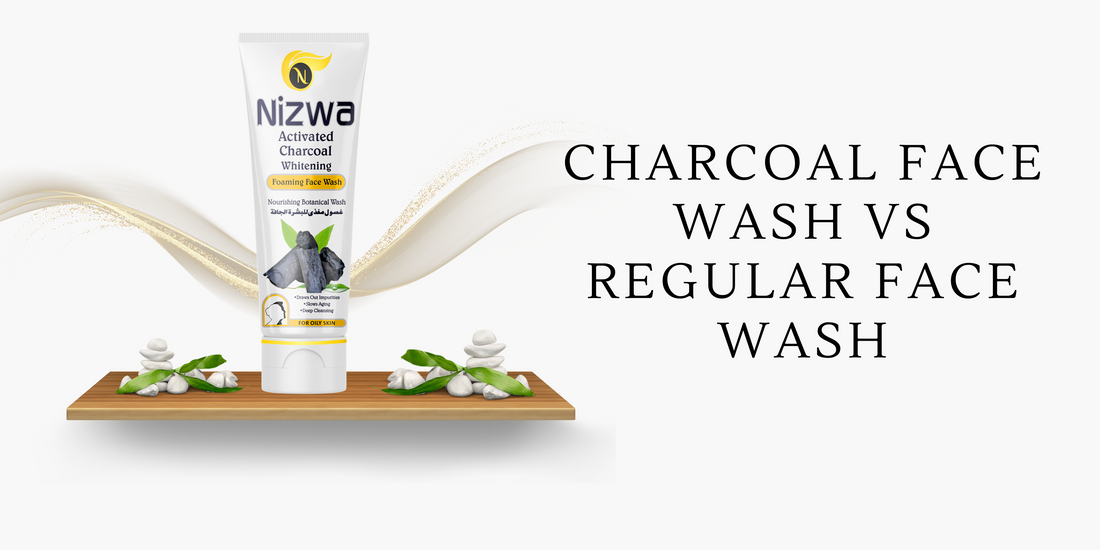
Charcoal Face Wash vs Regular Face Wash: Which is Better for Oily Skin?
If you’ve been struggling with oily skin, you know how tricky it is to find the perfect face wash. The constant shine, enlarged pores, breakouts—it’s a full-time job keeping it all under control. And with so many products on the market, the question comes up often: Charcoal face wash vs regular face wash—what works better for oily skin?
What is Charcoal Face Wash?
Charcoal face wash contains activated charcoal, a powerful natural ingredient known for its deep-cleansing abilities. Activated charcoal acts like a magnet for dirt, oil, and impurities, drawing them out of the skin's surface and pores.
Key Benefits of Charcoal Face Wash for Oily Skin:

-
Deep pore cleansing: Activated charcoal pulls out excess sebum and grime that clog pores.
-
Reduces blackheads and whiteheads: Ideal for preventing breakouts caused by oil buildup.
-
Mattifying effect: Helps control shine and gives a fresh, matte finish.
-
Gentle exfoliation: Some charcoal face washes have mild exfoliating beads or ingredients to remove dead skin cells.
What is a Regular Face Wash?
“Regular face wash” is a broad term and can refer to any non-charcoal-based cleanser. These may be formulated with ingredients like glycerin, salicylic acid, tea tree oil, fruit extracts, or moisturizing agents. While many of them are great in their own right, their effectiveness varies based on formulation.
Types of Regular Face Washes:
-
Cream-based: Good for dry skin, but may worsen oiliness.
-
Gel-based: Lightweight and better suited for oily to combination skin.
-
Foaming: Popular for oily skin, but some can be drying or overly harsh.
-
Salicylic acid-based: Targets acne and oily skin, but can cause irritation if overused.
When to Choose Charcoal Face Wash
Go for a charcoal face wash if:
-
Your skin gets greasy within a few hours of washing.
-
You frequently deal with clogged pores and blackheads.
-
You wear makeup or SPF daily and need a deeper cleanse.
-
You want a product that detoxifies and leaves your skin feeling refreshed.
Pro tip: Use charcoal face wash 2–3 times per week to avoid over-drying. Follow with a lightweight, oil-free moisturizer to maintain balance.
When to Use Regular Face Wash
-
You’re looking for a gentle cleanser for daily use.
-
Your skin is oily but sensitive.
-
You need specific active ingredients like salicylic acid or niacinamide.
-
You want a cleanser that won’t strip your skin’s natural barrier.
Can You Use Both?
Yes! Many skincare experts recommend alternating between a charcoal face wash and a gentle, regular face wash. For example:
-
Morning: Use a light gel-based or foaming face wash.
-
Night (2–3x/week): Deep cleanse with a charcoal face wash to remove oil and impurities.
This rotation helps prevent over-cleansing while still addressing oiliness and clogged pores.
Final Verdict: Which is Better?
For oily skin, charcoal face wash offers stronger oil control and deeper pore cleansing, making it a great option. However, it’s best used as part of a routine that includes gentler products to avoid dryness or irritation.
Best of both worlds:
-
Use charcoal face wash for detox and deep cleansing.
-
Use regular face wash for gentle, daily maintenance.
Conclusion
Charcoal face wash is great for deep cleansing and oil control, while regular face wash is ideal for daily use and gentle care. For oily skin, the best approach is balance—use charcoal face wash a few times a week for a detox boost, and a gentle regular cleanser daily to keep your skin fresh and healthy.
Frequently Asked Questions
Q: Can I use charcoal face wash every day?,
A: It’s better to use it 2–3 times per week. Overuse can strip the skin’s natural oils and cause dryness or irritation.
Q: Is charcoal face wash good for acne?
A: Yes, it helps prevent acne by clearing out excess oil, dirt, and bacteria from the pores.
Q: What skin type is charcoal face wash best for?
A: Oily, combination, and acne-prone skin types benefit most from charcoal face wash.
